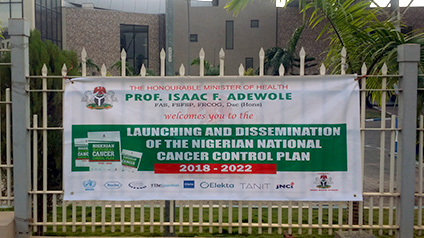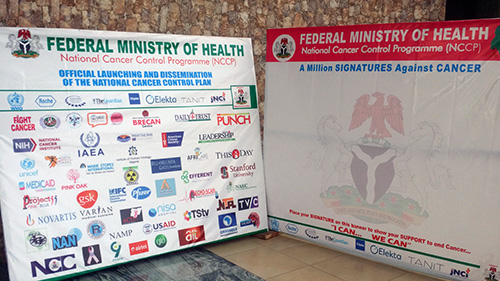Each year, 72,000 people die of cancer in Nigeria, with another 102,000 cases diagnosed. Lack of access to diagnosis and treatment, sparse public awareness, and an inadequate number of qualified health professionals and equipped treatment centers result in a high number of deaths that are largely preventable. Two often treatable forms of cancer, breast and cervical, account for a significant number of all cases in Nigeria, but the rate of death from breast cancer is triple that of the United States.
In 2015, CHAI, along with the American Cancer Society (ACS), launched work to reduce mortality from cancer in sub-Saharan Africa, where deaths from the disease are significant and growing. The incidence of cancer in the region is projected to increase by 85 percent in the next 15 years. Due primarily to delays in access to diagnosis and treatment, 80-90 percent of cases are in advanced stages by the time that they are treated, resulting in high levels of mortality. In Nigeria, CHAI is working together with partners and the Federal Ministry of Health to reverse these trends.

At an event in Abuja on April 13, the Nigerian Federal Ministry of Health launched a plan to effectively prevent and treat cancer in the country. Over the next five years, the Cancer Control Plan (CCP) will serve as a roadmap for the Ministry of Health to save lives and improve care for those with cancer.
At the event, the Honorable Minister of Health, Professor Isaac Adewole, joined members of the Cancer Control Steering Committee, and a large number of stakeholders and partners that worked together to develop the plan. From 2018 to 2022, the CCP will help improve treatment and decrease mortality from cancer through a number of initiatives including:
• Increased access to screening and detection of cancer
• Improved access to quality and cost-effective cancer treatment
• Improved end-of-life care for patients and their families
• Increased public awareness about the disease
• Improved data collection and dissemination, and
• Effective coordination of cancer resources for Nigeria
The Honorable Minister for Health, Prof. Adewole stated at the event, “The National Cancer Control Plan is a comprehensive strategy document that had inputs from diverse stakeholders and outlines a clear road map for cancer control initiatives over the next five years.”
The CCP was a collaborative effort with the Ministry of Health, ACS, CHAI, and other stakeholders, including the U.S. government’s National Cancer Institute. CHAI provided technical support in development of the plan and helped to support the Ministry in setting up the National Cancer Control Steering Committee, Chaired by Prof. Adewole.
Founder and Board Chair of the Medicaid Cancer Foundation, Her Excellency, the wife of the Governor of Kebbi State, Dr. Zainab Bagudu said, “Cancer is a complex disease that requires all stakeholders working together to create a better outcome for patients.”
Among other things, the plan will improve care at comprehensive cancer care centers where Nigerians go for cancer diagnosis and treatment. There are currently only nine of these centers throughout the country (eight public and one private), serving a population of 186 million. Due to non-functional equipment, lack of access to medication and treatment, and an absence of trained staff, patients often do not receive the level of care necessary to properly diagnose and treat their disease.
To address this, the plan aims to improve the care offered at these centers by strengthening the health workforce and ensuring that there is functioning, quality equipment and medication. The plan calls for a number of steps to increase the health workforce in cancer care with a goal of increasing the percentage of trained and available health workers by 60 percent by 2022. This trained workforce will have a deeper understanding of standards of care for effective treatment and will follow updated treatment guidelines for cancer management. The Ministry also plans to establish Medical Oncology and Nuclear Medicine specialties in Nigeria’s post-graduate medical colleges.
Significantly, the plan will also address barriers to access for critical cancer medications by lowering prices and establishing a coordinated procurement mechanism to ensure that all comprehensive cancer care centers centrally procure oncology drugs.

In 2017, Nigeria was selected as one of six sub-Saharan African countries to participate in market access agreements with Pfizer Inc. and Cipla Inc. to expand access to sixteen essential cancer treatment medications, including chemotherapies. The agreements set competitive prices on the medicines, creating savings for the government and improving the quality of treatment available.
In addition to increasing access to treatment, the plan will also help ensure more effective screening for the disease by supporting the government to coordinate its screening programs at all levels of care with a goal of screening half of the eligible population by 2022 and referring all confirmed cases for treatment. Over the long-term, the Ministry of Health aims to incorporate routine screening of eligible cancers into existing health programs. This is particularly important for cancers such as breast, cervical, prostate and colorectal cancers which can often be successfully treated when found early.
The plan will also help to establish a functional and sustainable supply chain by 2020 and develop a robust maintenance strategy to ensure timely and effective maintenance of equipment. These measures will help ensure the availability of functional equipment in all comprehensive cancer care centers and build capacity of local equipment maintenance staff for preventative and corrective maintenance.
The CCP also calls for robust steps to increase public awareness of cancer including prevention, such as vaccinations for the Human Papilloma Virus (HPV), known to cause cervical cancer, and hepatitis, which can cause cancer of the liver. It will also improve data collection on cancer in the country and improve much-needed palliative care services for people with cancer.
Last week’s launch of the CCP is just the first step toward attaining the plan’s ambitious goals. CHAI will continue to work with its partners and the Ministry to ensure that the Cancer Control Plan is fully implemented.





